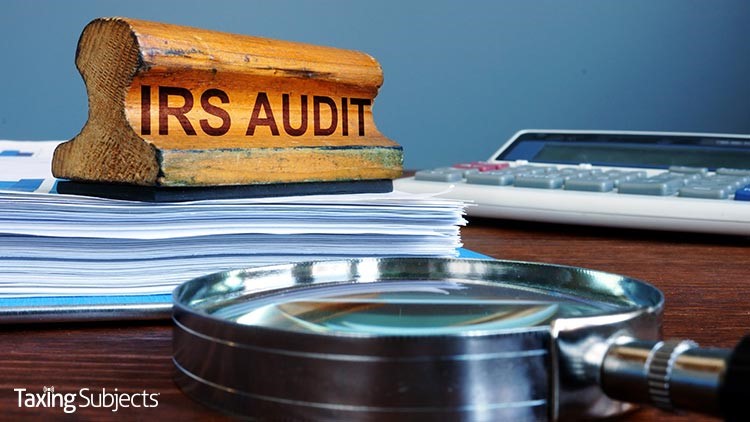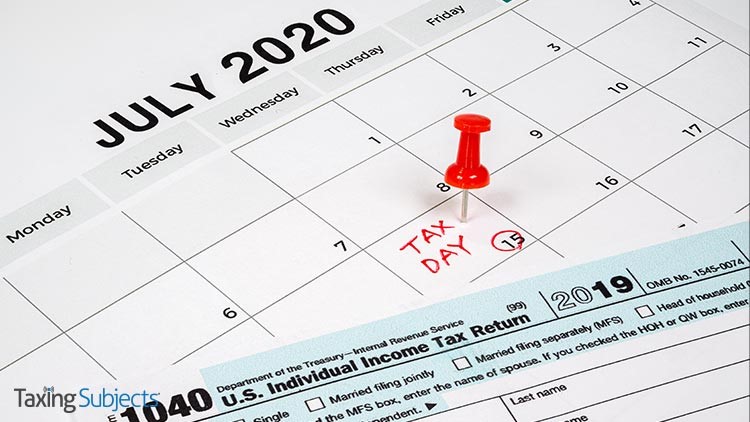by The Tax Place | Jul 10, 2020 | Tax Tips and News
The American Institute of CPAs is asking the Internal Revenue Service to further extend the deadline for filing and paying income taxes. The deadline for filing and payment of tax due is July 15, and the IRS says the agency won’t push back the deadline further.
Accounting Today magazine reports the AICPA makes its case in a letter to the IRS, saying the the COVID-19 pandemic continues to spread and record numbers of cases have been reported across the U.S.
The AICPA sets forth three major areas where the institute believes further relief should be issued:
Penalty Relief
Just like on a regular April 15 tax deadline, taxpayers who fail to file a return or pay the tax due by the July 15 deadline face a penalty. Accounting Today reports the AICPA recommends the IRS waive penalties automatically for the 2019 tax year all the way through the extended filing period for all taxpayers. The institute goes further, asking the IRS to take another look at the impact of the coronavirus during 2021 and consider offering similar penalty relief for the 2020 tax year as well.
Delay in IRS Collections
The AICPA has recommended the IRS stop its automatic collections of liens and levies for at least an additional 90 days after the July 15 deadline. The institute suggests reassessing restarting any collection activities at that time.
Normally, taxpayers receive a series of automated notices if they don’t pay their taxes in full at the time they’re due. The notices demand payment while reminding them of the amount owed and any penalties and interest accrued. The notices are a precursor of the automatic collection process, which continues until the tax debt is paid, or the case is moved to a revenue officer, or the IRS is no longer able to collect the tax legally.
Installment Agreements
At present, taxpayers who can’t pay their full tax bill in one payment can enter into an installment agreement with the IRS. AICPA suggests the IRS create an expedited installment agreement approval process, based on realistic payment arrangements for taxpayers who’ve been affected by the pandemic.
Accounting Today reports the AICPA recognizes the “hardship and uncertainty for taxpayers, and their advisers, and for the IRS,” created by the coronavirus. The institute’s suggestions, AICPA says, simply ask the IRS to do their part in a slowly opening environment.
For its part, the IRS maintains that the July 15 deadline will stay as-is. The agency maintains that its People First Initiative “endeavored to provide unprecedented relief to help those who owed federal taxes and allow them extra time.” But the bottom line remains: taxpayers who didn’t make previously owed tax payments between March 25 and July 15 because they were given extra time to do so, now need to pay up or face penalties or possibly default on their payment agreements.
Our thanks to Accounting Today and to AT Editor Michael Cohn.
– Story provided by TaxingSubjects.com
by The Tax Place | Jul 8, 2020 | Tax Tips and News
The Internal Revenue Service says it has expanded its list of retail partners who accept cash payments for federal taxes. This cash payment option is available for individual and business taxpayers alike.
The IRS has a continuing partnership with ACI Worldwide’s OfficialPayments.com and the PayNearMe Company that allows taxpayers to make their tax payments without a bank account or credit card. They can do so at participating 7-Eleven stores, Ace Cash Express and Casey’s General Stores nationwide.
Taxpayers wishing to use the cash payment option should:
- Go online to the gov/payments webpage;
- Select the cash option in the “Other Ways You Can Pay” section;
- Follow the directions.
- NOTE: There is a $1,000 payment limit per day and a $3.99 fee for each payment.
The PayNearMe process involves three steps, so the IRS strongly recommends cash payers choosing this option to start the process well ahead of any tax deadline to avoid interest and penalty charges.
For taxpayers who do not have a need to pay in cash, there are other options to pay online, by phone or with a mobile device and the IRS2Go app.
IRS Direct Pay is a secure online payment option that allows taxpayers to pay directly from their bank accounts — and it’s free. The IRS has partnered with Official Payments since 1999 for taxpayers who want to use a credit card to pay their tax bill.
The IRS reminds all taxpayers to be aware of email schemes. Taxpayers will only get an email from OfficialPayments.com or PayNearMe if they have initiated the payment process.
– Story provided by TaxingSubjects.com
by The Tax Place | Jul 7, 2020 | Tax Tips and News
The Internal Revenue Service has a little excess cash it would like to get rid of. It comes in the form of unclaimed income tax refunds for taxpayers who didn’t file a 2016 tax return.
The unclaimed refunds are worth some $1.5 billion and the IRS says about 1.4 million individual taxpayers could have a share in the haul if they file a 2016 return. But they need to do it quickly.
“The IRS wants to help taxpayers who are owed refunds but haven’t filed their 2016 tax returns yet,” said IRS Commissioner Chuck Rettig. “Time is quickly running out for these taxpayers. There’s only a three-year window to claim these refunds, and the window closes on July 15. To claim the refund, a return for tax year 2016 must be filed by July 15, 2020.”
IRS Notice 2020-23 extended the due date for filing tax year 2016 returns and claiming refunds for that year to July 15 because of the COVID-19 pandemic. To claim and collect a tax year 2016 refund, taxpayers must file their 2016 tax returns with the IRS no later than July 15.
The midpoint for the unclaimed 2016 refunds, the IRS notes, is $861 — that means half of the refunds are more; half are less. As the commissioner mentioned, there is a three-year period where the refunds can be claimed. After the July 15 tax deadline, any refunds that remain unclaimed become property of the Treasury.
No Penalty to File Late
If a refund is involved, there’s no penalty for filing late. But there are a few things to keep in mind. Taxpayers seeking a 2016 tax refund should know that their checks may be held if they have not filed tax returns for 2017 and 2018. In addition, the refund will be applied to any amounts owed to the IRS or a state tax agency and may be used to offset unpaid child support or past due federal debts, such as student loans.
There is another potential loss to consider for those who don’t make the July 15 filing deadline. Besides the potential loss of the waiting refund, the taxpayer who doesn’t file for 2016 may miss out on the Earned Income Tax Credit (EITC). For 2016, the EITC was worth as much as $6,269.
The EITC helps individuals and families whose incomes are below certain thresholds. The thresholds for 2016 were:
- $47,955 ($53,505 if married filing jointly) for those with three or more qualifying children;
- $44,648 ($50,198 if married filing jointly) for people with two qualifying children;
- $39,296 ($44,846 if married filing jointly) for those with one qualifying child, and;
- $14,880 ($20,430 if married filing jointly) for people without qualifying children.
The IRS says you should get paperwork in order now.
Taxpayers who are missing Forms W-2, 1098, 1099, or 5498 for the years 2016, 2017 or 2018 should get copies from their employer, bank or other payer. If they can’t get copies, taxpayers can order a free wage and income transcript at IRS.gov using the Get Transcript Online tool.
As an alternative, taxpayers can mail Form 4506-T to request a wage and income transcript, which shows data from information returns filed with the IRS such as Forms W-2, 1098, 1099, Form 5498 and even IRA contribution information. The information on the transcript can be used to file the corresponding tax return.
IRS figures show Texas with the largest estimated number of taxpayers with possible 2016 refunds at 143,400 taxpayers. Vermont has the smallest number with 2,800. Alaska leads with the largest median refund amount at $979. Idaho has the lowest median refund: $727.
– Story provided by TaxingSubjects.com
by The Tax Place | Jul 2, 2020 | Tax Tips and News
The office closures suffered by the Internal Revenue Service during the opening weeks of the coronavirus pandemic lead to a near shutdown of the agency’s audit program, a new report suggests.
Between April 1 and July 15, the IRS did not start new field, office, or correspondence audits as part of the “People First Initiative” — unless the statute of limitations would run out and keep the IRS from continuing a case later. All in-person meetings in ongoing examinations were also suspended.
The yearly report issued by the Taxpayer Advocate Service (TAS) says the agency tried to work existing audit cases and refund claims remotely during the shutdown period whenever it was possible. Nevertheless, the report finds that the IRS just couldn’t catch up.
IRS data show that corporate audits during that time fell by 71%; partnership audits were down 79% during the same period, while individual audits were 65% lower than the year before.
Does the report contain contradictory advice?
The TAS report says the IRS advised taxpayers to continue to respond to any IRS examination notice they’d already received — even if it was only to explain why they couldn’t fully comply with the IRS request. But with phone lines temporarily closed and millions of pieces of mail unopened at the IRS, taxpayers’ options for communication were limited at best.
TAS concedes that the IRS did allow taxpayers and representatives to respond by e-fax and could use digital signatures in certain circumstances.
Nevertheless, “Many taxpayers may have trouble obtaining acceptable requested documentation in a timely manner. This leads to delays in examinations, and the IRS may request an extension of the statute of limitations on assessment,” the report finds.
Taxpayers, the Taxpayer Advocate states, will have to weigh the pros and cons of signing statute of limitation extensions, especially when the delay was caused solely by the IRS shutdown.
The report says the way around the bottleneck is clear: “TAS plans to protect taxpayers’ right to challenge the IRS’ position and be heard by ascertaining the status of their audits when the IRS fully reopens and working with the IRS to accept alternative documentation.”
– Story provided by TaxingSubjects.com
by The Tax Place | Jul 1, 2020 | Tax Tips and News
The Internal Revenue Service has some bad news for taxpayers hoping that the tax filing and payment deadlines would get pushed back again. In a recent IRS Newswire press release, the agency said taxpayers should either file their tax return or an extension by July 15.
What is the deadline for taxpayers who request an extension?
There are three important deadlines for taxpayers who want to get an extension:
- Request the extension by July 15, 2020
- Pay tax owed by July 15, 2020
- File the now-extended tax return by October 15, 2020
The IRS explained that there are two ways to secure an extension: file Form 4868 or pay tax owed. They also said that paying can “save a step” on July 15: “When getting an extension by making a payment, taxpayers do not have to file a separate extension form and will receive a confirmation number for their records.” Besides, missing the payment deadline can add penalties and interest to your tax bill.
How do I pay my tax bill?
The IRS suggested five ways to pay taxes: IRS Direct Pay, the Electronic Federal Tax Payment System (EFTPS), third-party payment processors for debit and credit cards, a check or money order, or even a loan. Those who can’t pay all of what they owe can request a payment agreement—like an Online Payment Agreement, Installment Agreement Request, temporarily delayed collection, or an Offer in Compromise—which the agency said can mitigate potential penalties and interest.
“Though interest and late-payment penalties continue to accrue on any unpaid taxes after July 15, the failure to pay tax penalty rate is cut in half while an installment agreement is in effect,” the IRS explained. “The usual penalty rate of 0.5% per month is reduced to 0.25% for the calendar quarter beginning July 1, 2020, the interest rate for underpayment is 3%.”
What about state tax filing deadlines?
The IRS also noted that state tax filing deadlines could be different from the July 15 filing deadline. Check out our “Did COVID-19 Change My State Individual Income Tax Deadline” blog to double check your state deadline.
Source: IR-2020-134
– Story provided by TaxingSubjects.com





